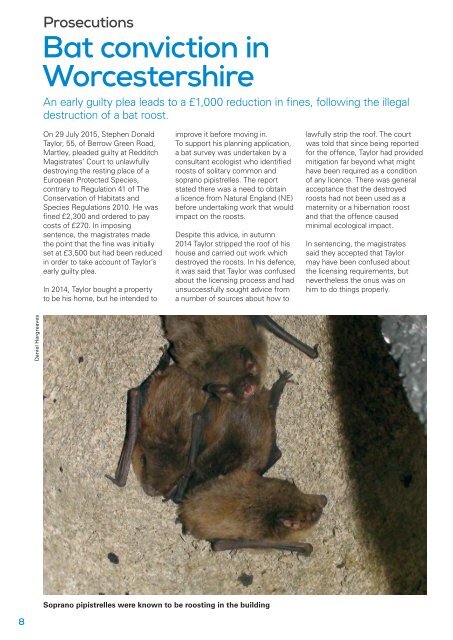Legal Eagle
Legal-Eagle-78_tcm9-416630
Legal-Eagle-78_tcm9-416630
Create successful ePaper yourself
Turn your PDF publications into a flip-book with our unique Google optimized e-Paper software.
Prosecutions<br />
Bat conviction in<br />
Worcestershire<br />
Prosecutions<br />
Rosie Corner<br />
An early guilty plea leads to a £1,000 reduction in fines, following the illegal<br />
destruction of a bat roost.<br />
Daniel Hargreaves<br />
On 29 July 2015, Stephen Donald<br />
Taylor, 55, of Berrow Green Road,<br />
Martley, pleaded guilty at Redditch<br />
Magistrates’ Court to unlawfully<br />
destroying the resting place of a<br />
European Protected Species,<br />
contrary to Regulation 41 of The<br />
Conservation of Habitats and<br />
Species Regulations 2010. He was<br />
fined £2,300 and ordered to pay<br />
costs of £270. In imposing<br />
sentence, the magistrates made<br />
the point that the fine was initially<br />
set at £3,500 but had been reduced<br />
in order to take account of Taylor’s<br />
early guilty plea.<br />
In 2014, Taylor bought a property<br />
to be his home, but he intended to<br />
improve it before moving in.<br />
To support his planning application,<br />
a bat survey was undertaken by a<br />
consultant ecologist who identified<br />
roosts of solitary common and<br />
soprano pipistrelles. The report<br />
stated there was a need to obtain<br />
a licence from Natural England (NE)<br />
before undertaking work that would<br />
impact on the roosts.<br />
Despite this advice, in autumn<br />
2014 Taylor stripped the roof of his<br />
house and carried out work which<br />
destroyed the roosts. In his defence,<br />
it was said that Taylor was confused<br />
about the licensing process and had<br />
unsuccessfully sought advice from<br />
a number of sources about how to<br />
lawfully strip the roof. The court<br />
was told that since being reported<br />
for the offence, Taylor had provided<br />
mitigation far beyond what might<br />
have been required as a condition<br />
of any licence. There was general<br />
acceptance that the destroyed<br />
roosts had not been used as a<br />
maternity or a hibernation roost<br />
and that the offence caused<br />
minimal ecological impact.<br />
In sentencing, the magistrates<br />
said they accepted that Taylor<br />
may have been confused about<br />
the licensing requirements, but<br />
nevertheless the onus was on<br />
him to do things properly.<br />
A common pipistrelle roost was destroyed when one of the buildings was demolished<br />
London bat case<br />
Fines and costs for bat roost removal cost developers more than £5,000.<br />
On 17 September 2015, City and<br />
Westminster Developments of<br />
Aston Mews, 103 Kilburn Lane,<br />
London W10 4AN, pleaded guilty<br />
at Hendon Magistrates’ Court to<br />
destroying bat roosts at Great<br />
North Way, Barnet, contrary to<br />
Regulation 41 of The Conservation<br />
of Habitats and Species<br />
Regulations 2010. The company<br />
was fined £4,500 and ordered<br />
to pay £85 costs plus a<br />
victim surcharge of £450.<br />
In order to develop an area<br />
of land, City and Westminster<br />
Developments wanted to demolish<br />
four buildings. Bat surveys were<br />
undertaken, with roosts identified<br />
in three of the buildings. Despite<br />
being aware of the roosts, on<br />
19 August 2014, demolition of<br />
one building took place, destroying<br />
a common pipistrelle roost.<br />
This case is of significance as it is<br />
the first prosecution of this nature<br />
within the Metropolitan Police area.<br />
The Bat Conservation Trust is<br />
grateful to DC Sarah Bailey of the<br />
force’s Wildlife Crime Unit and to<br />
the CPS for its work on this case.<br />
More bat roosts destroyed<br />
Failing to wait for a licence to be processed before working on a property with<br />
long-eared and pipistrelle bats led to a court appearance, and a £1,500 fine.<br />
On 18 September 2015,<br />
Timothy Bull, of Mosley Mews,<br />
Rolleston-on-Dove, Staffordshire,<br />
pleaded guilty at Burton upon Trent<br />
Magistrates’ Court to destroying<br />
common pipistrelle and brown<br />
long-eared bat roosts at Beech<br />
Lane, Stretton, Burton upon Trent,<br />
contrary to The Conservation of<br />
Habitats and Species Regulations<br />
2010. He was fined £1,500 and<br />
ordered to pay costs of £85 plus a<br />
victim surcharge of £120.<br />
Bull initially engaged with his<br />
ecological consultant about a<br />
licence application being submitted<br />
to Natural England. However, Bull<br />
destroyed the roosts before any<br />
licence was issued.<br />
The Bat Conservation Trust thanks<br />
investigating officer DC Steven<br />
Thornhill of Staffordshire Police<br />
and the CPS specialist wildlife<br />
crime prosecutor Stephen Davies<br />
for their work on this case.<br />
Paul Sutherland<br />
Soprano pipistrelles were known to be roosting in the building<br />
In 2014, Bull applied for planning<br />
permission to develop a property.<br />
A bat survey was undertaken and<br />
revealed the presence of roosts<br />
used by three common pipistrelles<br />
and one brown long-eared bat.<br />
All UK bat species, including<br />
long-eared bats, are legally<br />
protected by domestic and<br />
international legislation<br />
8<br />
9


